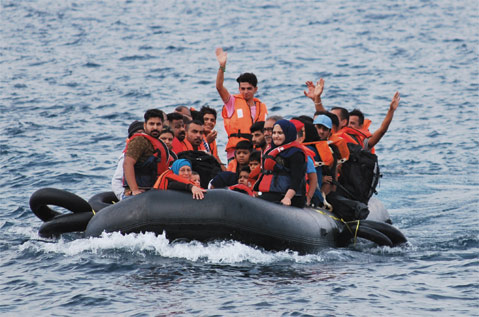UCSB Global Studies Scholars Critique EU-Turkey Deal
Call Agreement Illegal, Unworkable, Expressive of Emerging Social Anxieties

Scholars at UCSB’s global studies department contend that the European Union and Turkey migration deal addressing the refugee crisis in Greece is not only illegal under international law and unworkable, but also fueled by far-right nationalism in Europe and rising xenophobia.
Effective March 20, the deal says for every Syrian the E.U. sends back to Turkey, a Syrian in Turkey is resettled to Europe; it caps the number of Syrians allowed to enter Europe from Turkey at 72,000. Around 200 have been sent back to Turkey thus far. Close to 60,000 refugees are currently in Greece, where over 500,000 landed in 2015.
According to the UCSB Current, global studies associate professor Paul Amar disagrees with the notion that Syria’s horrific civil war has caused the refugee crisis and subsequent border restrictions.
“Refugee flows from the Middle East are not forcing this political shift. It’s neo-nationalists in Turkey and the EU that are seizing on this problem and making it into something catastrophic,” said Amar. “This panic is the fruit of a long-term transformation in the European Union culminating in the revival of a very crude kind of austerity politics.”
Global studies Ph.D. candidate and German native Katja Siepmann sees rampant Islamophobia in Germany as critical to this political crisis, marked by xenophobia and anti-immigration parties. “In the view of party leaders, Islam is not a religion, but a political ideology that does not respect the separation of church and state and therefore would contradict basic German law,” she told the Current. “This right-wing populist party did not exist a couple of years ago. They are distorting the situation and are capitalizing on the fear of the people.”
Turkey native and fellow global studies Ph.D. candidate Sarp Kurgan calls the issue, “a violation of international law on refugees,” according to the Current. He emphasized the deal’s breach of international legal principle non-refoulement, which prohibits a country from sending a refugee back to their country of origin or anywhere they are subject to persecution.
Yet economic security, according to Kurgan, Siepmann, and Amar, is at the root of this tension rather than fears of terrorism, pointing to unemployment in southern European nations as fueling anti-immigrant sentiments.
According to research by Brussels-based Migration Policy Institute, EU policymakers are entirely aware of the drastic consequences of violating EU and international legal commitments to migrant rights. In the deal, EU leaders hope to limit smugglers and potential asylum seekers from crossing EU borders in the near future.
In effect, they may send a message to host countries that the legal obligation to protect migrants, when becoming domestically unpopular, can be renegotiated. Other countries like Lebanon, an overstretched refugee host, could follow suit and make conditions for refugee populations much more untenable.
Nevertheless, the continuous refugee flows paired with limitations of protection in countries like Greece and Turkey suggest that this crisis is not yet over. “As the deal unfolds, we’ll see if it’s even feasible,” global studies master’s candidate Clint Betkey told the Current. “Whether the deal stops people from coming…we have to see how it plays out over time.”



